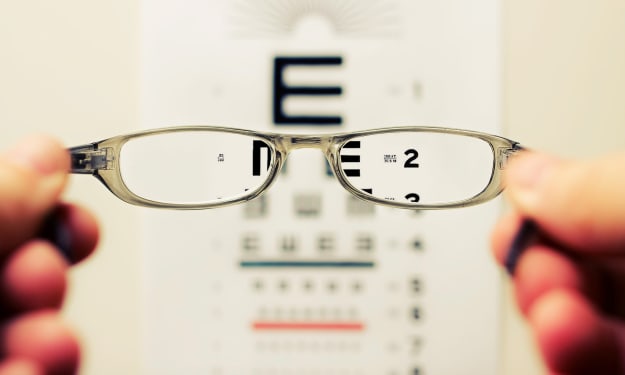Accommodations for Deaf and Hard of Hearing People Explained and Exposed
You may know about some accommodations that Deaf and Hard of Hearing people require or request, such as interpreters or closed captioning...

But those two accommodations just scratch the surface of the many products we use daily.
Then there’s the “dark” side of accommodations – the denial, the abuse of, and the scarcity of these services.
Please remember that it’s never “one size fits all”. One accommodation for one Deaf or Hard of Hearing person may not work or be accepted by another.
So, let's look at the various accommodations available out there and what people don't understand about them:
ASL Interpreters
An American Sign Language (ASL) interpreter facilitates clear communication between a Deaf person and a Hearing person. This is one of the most basic human needs - to communicate, yet it’s often denied repeatedly to Deaf people.
I see three major reasons for this:
- Price – Many companies & service providers (like hospitals) quote it being too expensive to provide. Medical providers can receive Medicaid and SCHIP compensation for interpreters, and private companies can receive ADA tax credits for providing interpreters.
- Availability – “We can’t find one” is often provided as an excuse. You just need to Google “Deaf services near me” to see a list of agencies available in your area. Many Deaf people also carry interpreter information cards with them as well.
- "They’re Fine" – Saying that lipreading or writing back on forth on paper is good enough for communication. Maybe for ordering a coffee or fast food – but never for complex issues like medical, legal, or technical issues. For some Deaf people, English is their second language and may not be able to grasp terminology or jargon clearly. This would be akin to refusing a Spanish speaker an interpreter and instead asking them to tell you in their “broken English” to describe what’s happening.
Lastly, I really want to stress that Deaf people need certified, competent interpreters, not someone who “knows” sign.
Let me reframe this for you – you got arrested and are being charged with murder. Do you want the lawyer who passed the Bar and has several years of court experience under their belt? Or, do you want the law student who read a few books and took a class or two? Yes, it’s that bad.
Captioning
Pretty much everyone knows what captioning is – it’s available on all televisions, available on social media sites and streaming services. Many of the general public turn captioning on either to catch details they missed, or to keep the sound low or off as not to disturb others.
Sounds easy right? Here’s the kicker:
- Family Members – There are actually family members of Deaf individuals that flat out refuse to turn on captioning for them as it’s too distracting.
- Movie Theaters – More and more movie theaters are providing captioning devices – but surprise, surprise many don’t work. They’re either broken, not charged, or staff have no training.
- Open Captioning – A few movie theaters are willing to provide open captioning for movies – subtitles directly on the screen. But other movie goers have complained vehemently against them. But these same hearing people don't mind having subtitles on for foreign language films – see the irony?
More and more public places are leaving captioning on all the time on their televisions and I applaud them, but we still face backlash in many places.
VideoPhones
A videophone (VP) is an App, or a piece of equipment that allows Deaf people to call and chat with each other over video cameras.
A VP has a dial-pad, a list of contacts, a flashing alert and either uses your camera or a built-in camera. Many Deaf people receive this service for free, but “hearing” relatives and friends cannot request this specialized equipment or phone number. However they can call the person's phone number and get connected via a relay operator (explained next).
Relay Services
A relay service is a service used over the videophone (or a text version) and an operator on camera with the client that signs what’s spoken on the other end of the phone line and voices what the client signs.
The drawback is that many people who receive these calls from a Deaf person either:
- Hang up believing it’s a telemarketer
- Refuse to use the service citing its imposters, can’t use third-parties, or too much work
- Accuse the interpreter of making up stuff – when it came directly from the client
I once called a company regarding a bill I received and after some rough back and forth, the customer service insist that someone who can hear call them back and take care of it. I responded "You either can deal with an annoyed hearing husband who has no idea what's going on, or you can deal with me who knows the specifics and who's also holding the checkbook".
If we cannot call a business to take care of our business, and they're insisting to have someone who can "hear" call back - you are robbing us of our independence.
Visual Alert Systems
Visual alert systems are simple gadgets attached to important sounds around the house (or at work) that flashes a light to alert the Deaf or Hard of Hearing person to a noise.
We have alerting systems for:
- Door knocks/Doorbells
- Phones
- Alarm Clocks
- Fire Alarms
- Baby crying
- Cell Phone chimes
- Weather Alerts
I’ve seen stories where co-workers or family members disconnect these alerting systems of Deaf people because it’s “annoying”. This could be life-saving, but no, it bothers them too much.
Assistive Listening Devices
Assistive listening devices can range from hearing aids (HAs), FM systems, listening loops, to Cochlear Implants (CIs).
These are all well and good if the Deaf and Hard of Hearing individual chooses to use them. For some Deaf people these devices are worthless – makes everything garbled, louder, or just plain hurts to use.
There is a huge difference between hearing sound, and discriminating what those sounds mean. I can hear and identify environmental sounds (dog barking, music playing, etc.), but I cannot comprehend speech without lipreading.
I really want to stress that whether one chooses to wear one or not is their personal decision, period.
Too often, especially from medical professionals, the emphasis to get and use one is pushed or inquired about – even when the Deaf person’s there for a completely different issue.
If the Deaf or Hard of Hearing individual wants some assistive listening equipment like an FM system, do be sure it’s compatible with what they are already using. Giving a Deaf or Hard of Hearing person with hearing aids a listening device with earbuds isn’t going to work at all.
Speech to Text Apps
There are a variety of Speech to Text apps available that simply transcribe voice into written text on different devices the user has.
For example, I personally use Live Transcribe on my Android phone. There are otthers available for all systems, phones, tablets and computers.
Yes, they are not perfect, speech to text never is. But, they provide more access than without.
Yet, people have refused to use them, accuse the Deaf or Hard of Hearig person of recording them without permission, and even mocked the mistakes the app makes.
Final Word
The best way to accommodate a Deaf or Hard of Hearing person is to ask what works best for them. Be open to learning and listening.
As a company or service provider you really need to accommodate their needs, not what fits your budget or what is easily available. It's also the Law. (see ADA.gov)
Forcing a Deaf or Hard of Hearing individual to accept something that doesn’t work for them is discriminatory, dismissive, and demeaning.
If someone feels that an accommodation is an inconvenience for them – try being Deaf.
It's not about you.
About the Creator
Tracy Stine
Freelance Writer. ASL Teacher. Disability Advocate. Deafblind. Snarky.
Enjoyed the story? Support the Creator.
Subscribe for free to receive all their stories in your feed. You could also pledge your support or give them a one-off tip, letting them know you appreciate their work.






Comments
There are no comments for this story
Be the first to respond and start the conversation.